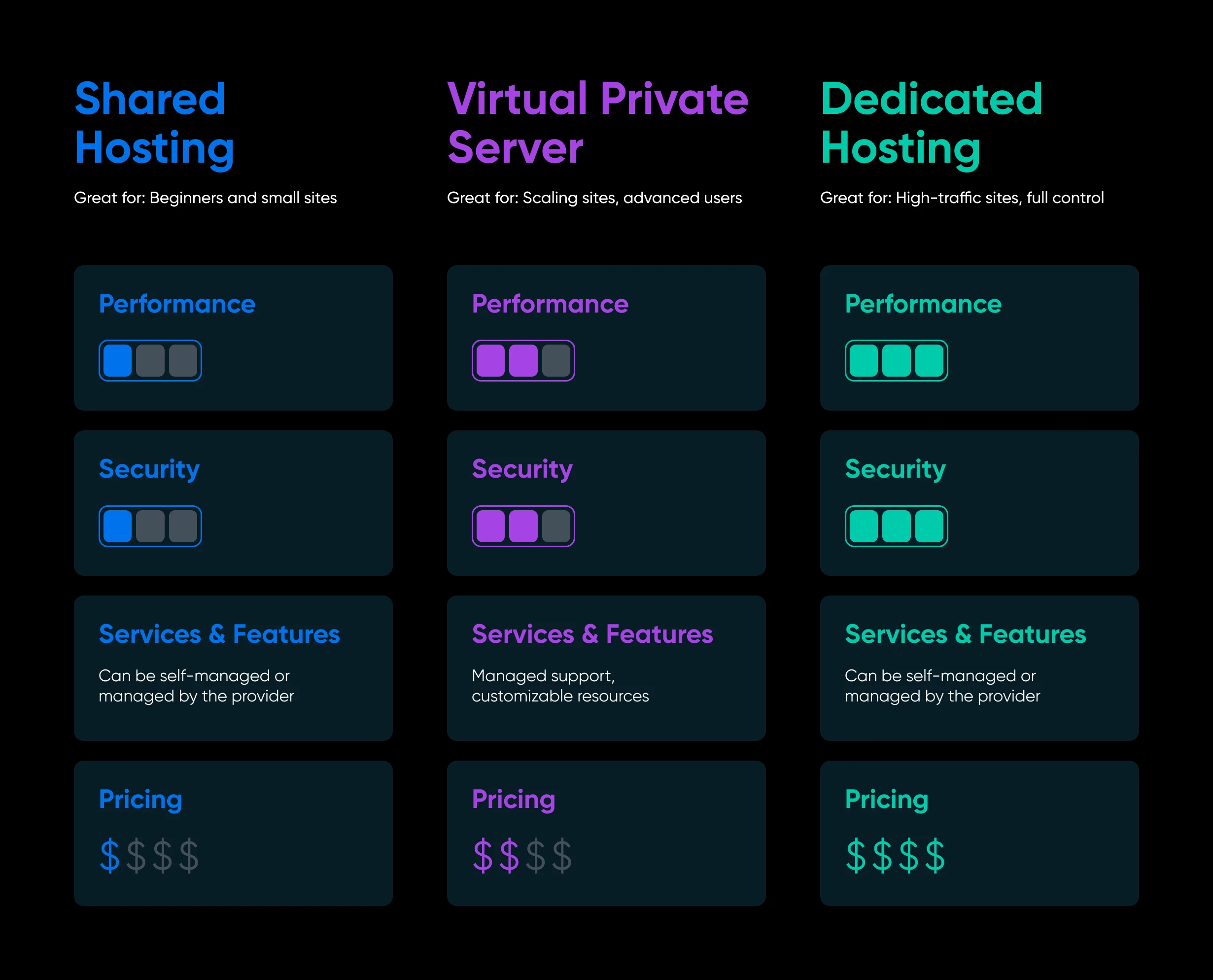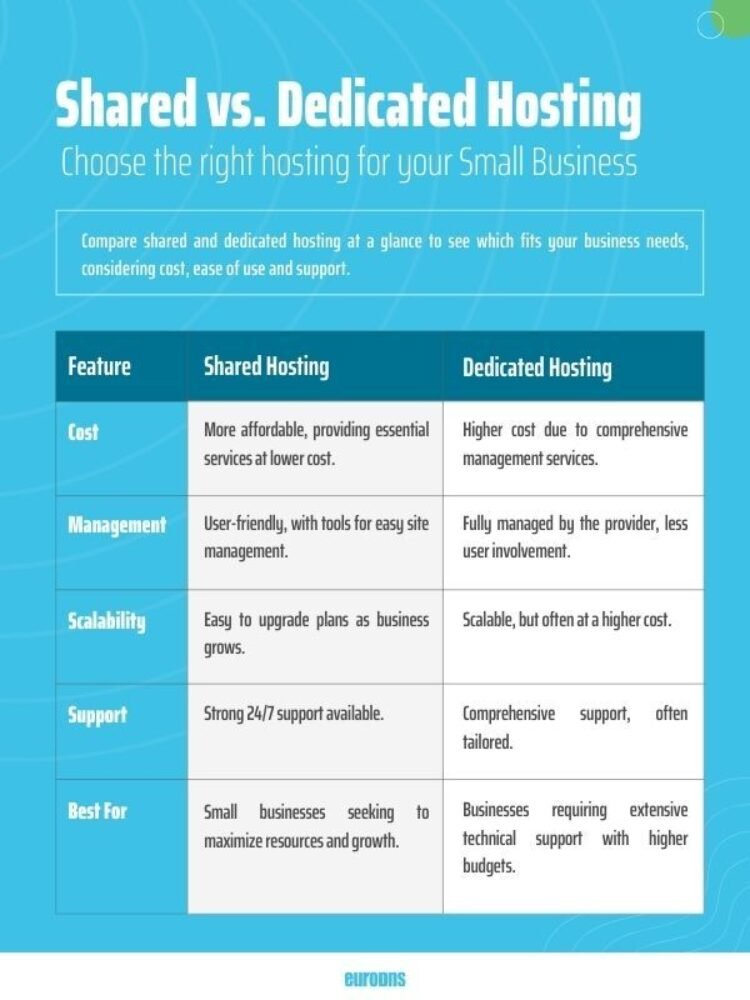Choosing the right hosting for your small business is crucial. It impacts your website’s performance and user experience.
Shared hosting and dedicated hosting are two popular options. Each has its pros and cons. Understanding these can help you make an informed decision. In this post, we’ll explore the differences between shared and dedicated hosting. We’ll look at their features, costs, and suitability for small businesses.
By the end, you’ll have a clearer idea of which hosting solution fits your business needs best. So, let’s dive in and find the perfect hosting for your small business.

Credit: www.dreamhost.com
Introduction To Web Hosting
Choosing the right web hosting plan can be confusing. It’s crucial to understand what web hosting is and how it can affect your business. Web hosting is a service that makes your website accessible on the internet. This service stores your website files on a server. When people visit your site, the server sends the files to their browser. This process is essential for your online presence.
Importance For Small Businesses
Web hosting is vital for small businesses. It affects your site’s speed, reliability, and security. A good web host ensures your site loads quickly. This keeps visitors on your site and improves your search engine ranking. A reliable host means less downtime. This ensures your site is always available to customers. Security is another key factor. A secure host protects your website from cyber threats.
Types Of Hosting
There are different types of web hosting. The main types are shared hosting and dedicated hosting. Shared hosting means multiple websites share one server. This option is cost-effective. It is suitable for small businesses with low traffic. Dedicated hosting means your website has its own server. This option is more expensive. It is ideal for businesses with high traffic and specific needs.
Shared Hosting Overview
Choosing the right hosting for your small business is crucial. Shared hosting can be a cost-effective option. It is suitable for small websites with moderate traffic. Let’s dive into what shared hosting is and its key features.
Definition
Shared hosting means multiple websites share a single server’s resources. This includes storage, bandwidth, and processing power. It is like sharing an apartment with roommates. Each website gets a part of the server, keeping costs low.
Key Features
- Cost-Effective: Shared hosting is budget-friendly. It is ideal for startups and small businesses.
- Easy to Manage: Most shared hosting plans include a user-friendly control panel. This simplifies tasks such as managing domains and emails.
- Basic Security: Shared hosting providers offer basic security features. These include firewalls and malware scanning.
- Technical Support: Most plans come with 24/7 customer support. This helps resolve issues quickly.
| Feature | Details |
|---|---|
| Cost | Low, starting at a few dollars per month |
| Performance | Moderate, suitable for low to medium traffic |
| Scalability | Limited, not ideal for high growth |
| Support | 24/7 support, usually via chat or email |
Shared hosting is a great starting point for small businesses. It offers essential features at an affordable price.
Benefits Of Shared Hosting
Shared hosting offers many benefits for small businesses. It is an excellent choice for those starting out. It provides a reliable and cost-effective solution. Let’s explore the key benefits of shared hosting.
Cost-effectiveness
Shared hosting is very affordable. Multiple websites share one server. This lowers the cost for everyone. You pay a fraction of the price of a dedicated server. Small businesses with tight budgets will appreciate the savings.
Many hosting providers offer plans starting at just a few dollars a month. This makes shared hosting accessible to everyone. You can also upgrade as your business grows. This ensures you only pay for what you need.
Ease Of Use
Shared hosting is easy to use. Most providers offer user-friendly control panels. These panels allow you to manage your website with ease. No advanced technical skills are required.
You can install applications with one click. This includes popular tools like WordPress. Easy-to-follow tutorials are often available. This helps you navigate any challenges.
Customer support is usually included. This is helpful if you have questions or need assistance. Shared hosting makes website management simple and stress-free.
Drawbacks Of Shared Hosting
Shared hosting is a popular choice for small businesses. It offers an affordable way to get online. Yet, it comes with several drawbacks. Understanding these limitations can help you make an informed decision.
Performance Limitations
Shared hosting means sharing resources with other websites. This can lead to performance issues. Your website might load slower during peak times. Slow loading times can frustrate your visitors. It can also affect your search engine rankings. A website that loads slowly can drive potential customers away.
Limited bandwidth is another concern. Shared hosting often comes with a cap on bandwidth usage. Exceeding this limit can slow down your site even more. It can also result in additional charges. This can be a significant drawback for growing businesses. Ensuring a smooth user experience is crucial.
Security Concerns
Shared hosting environments are more vulnerable to security threats. Since multiple sites share the same server, a breach in one site can affect others. This means your site could be at risk even if you follow best security practices. Shared hosting providers often have basic security measures. But these might not be enough to protect your business data.
Another issue is limited control over security settings. Shared hosting plans typically do not allow extensive customization. You might not be able to install advanced security tools. This can leave your site exposed to various threats. Investing in a more secure hosting option can safeguard your business.
Dedicated Hosting Overview
Dedicated hosting provides your small business with an exclusive server. This means your business gets all the server’s resources without sharing with others. Let’s explore the details of dedicated hosting to see if it fits your needs.
Definition
Dedicated hosting means you lease an entire server for your business. Unlike shared hosting, you do not share resources with other users. This exclusivity offers better performance and security. It is ideal for businesses with high traffic or specific needs.
Key Features
Dedicated hosting offers several benefits:
- Performance: All server resources are available for your website. This ensures faster load times.
- Security: Enhanced security measures protect your data. No sharing reduces the risk of breaches.
- Customization: You can configure the server to match your needs. This includes software and hardware choices.
- Reliability: Dedicated resources mean fewer downtimes. Better uptime ensures your site stays accessible.
- Support: Premium support options are available. Experts can help solve issues quickly.
Dedicated hosting is a powerful choice for small businesses. It provides control, reliability, and security that shared hosting cannot match.

Credit: www.cloudpanel.io
Benefits Of Dedicated Hosting
Choosing the right hosting plan for your small business can be challenging. Dedicated hosting offers many benefits. Let’s explore some key advantages of dedicated hosting for your business.
Enhanced Performance
Dedicated hosting means your website uses an entire server. This results in faster load times. No resources are shared with other sites. This boosts overall performance. Your visitors will enjoy quicker page loads.
Improved Security
With dedicated hosting, your data is more secure. You have the whole server to yourself. This reduces the risk of security breaches. You can also customize security settings. This ensures better protection against threats.
Drawbacks Of Dedicated Hosting
When deciding between shared hosting and dedicated hosting for your small business, it’s important to consider the potential drawbacks of dedicated hosting. Dedicated hosting offers many advantages, but it also comes with some challenges that may not suit every business.
Higher Costs
Dedicated hosting is more expensive than shared hosting. You are renting an entire server. This can be a significant expense for small businesses. The costs include not just the server rental but also ongoing maintenance. It might not be the best choice for those with tight budgets.
Technical Expertise Required
Managing a dedicated server requires technical knowledge. You’ll need skills in server management, security, and troubleshooting. If you lack this expertise, you may need to hire an IT professional. This adds to the overall cost. For small business owners without technical skills, this can be a major drawback.
Choosing The Best Option
Choosing the best hosting option for your small business is crucial. It affects your website’s performance, security, and scalability. Shared hosting and dedicated hosting are two popular options. Each has its pros and cons. Let’s dive into how to choose the best one for your needs.
Assessing Business Needs
First, identify your website’s needs. Consider your traffic levels. Shared hosting suits low to moderate traffic. If your traffic is high, dedicated hosting is better. Next, think about the type of content you host. Simple websites with text and images work well on shared hosting. Complex sites with videos and heavy data need dedicated hosting.
Also, evaluate your technical skills. Shared hosting requires less technical knowledge. It’s managed by the provider. Dedicated hosting needs more skills. You manage the server yourself. If you lack technical skills, shared hosting is easier to handle.
Budget Considerations
Budget is a key factor in choosing hosting. Shared hosting is cheaper. It’s a good option for startups and small businesses. You share server resources with others. This keeps costs low. Dedicated hosting is more expensive. You get a whole server to yourself. It’s suitable for businesses with a higher budget.
Also, consider the long-term costs. Shared hosting may have hidden fees. These can add up over time. Dedicated hosting has more upfront costs but fewer hidden fees. Weigh your current budget against future growth. Make sure your hosting choice can scale with your business.

Credit: www.entrepreneur.com
Frequently Asked Questions
What Is Shared Hosting?
Shared hosting means multiple websites share a single server. It’s cost-effective and easy to manage. Best for small businesses with low traffic.
What Is Dedicated Hosting?
Dedicated hosting provides a single server for one website. It offers better performance and security. Ideal for high-traffic websites needing more resources.
Which Hosting Is More Cost-effective?
Shared hosting is more cost-effective. It shares resources among multiple websites, lowering the cost. Suitable for small businesses starting online.
Is Dedicated Hosting Better For Security?
Yes, dedicated hosting offers better security. It provides isolated resources, reducing the risk of cyber-attacks. Ideal for sensitive data.
Conclusion
Choosing between shared and dedicated hosting depends on your business needs. Shared hosting is budget-friendly and easy to manage. It’s perfect for small websites with lower traffic. Dedicated hosting offers better performance and security. It’s ideal for larger sites with high traffic.
Assess your website’s growth potential and budget. Both options have their benefits. Consider your specific requirements before making a decision. Ultimately, the right choice will help your business succeed online.




